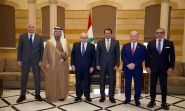
Five photos. One very short statement in Naqoura. That’s all it took for U.S. envoy Morgan Ortagus’s visit to Lebanon to make its point. The symbolism was clear: the era of endless chatter is over. Time to actually get things done. In a country where talking for the sake of talking is practically a national sport, that’s… a plot twist.
And how, exactly? Through “the mechanism.” Sounds like a sci-fi thriller title, doesn’t it? In reality, it’s the committee tasked with enforcing the ceasefire between Israel and Hezbollah since November 2024.
A new approach seems to be taking shape: opening up this so-called “mechanism,” which for now is limited to military personnel, to civilian figures—Lebanese and Israeli alike—ministers, for example. That could at least start some indirect talks to settle disputes and, hopefully, prevent another war.
The clock is ticking. It’s a race between a return to large-scale Israeli operations in Lebanon and holding on to a fragile, uneasy calm.
The President of the Republic said talks with Israel were necessary so Lebanon wouldn’t be left on the platform of oblivion.
Because there’s no time to waste.
On the Israeli side, Hezbollah is accused of trying to rebuild its arsenal, its weapons depots, and its tunnels, notably through Syria, via a still-active supply line.
In a stubbornness that borders on madness, the Iran-backed militia is digging its heels in, at least publicly. No way are they handing their weapons over to the Lebanese army!
And to underline just how fragile the situation is, the head of Egyptian intelligence made his rounds of the three presidencies after stopping in Jerusalem. The message was clear: don’t miss the peace train we kicked off with Donald Trump in Sharm el-Sheikh.
The Secretary-General of the Arab League echoed the same tune.
The stage is set: Westerners and Arabs are pushing Lebanon to shake off its monotonous lethargy, hoping to avoid the long, drawn-out sobs of fall violins. Let’s hope everyone catches the “coded” message.
Add the highly anticipated arrival of the new U.S. ambassador, Michel Issa, in about ten days, which will ramp up the pressure, and you have all the ingredients of Lebanon’s official dilemma. The country’s leadership is expected to charge headfirst through the exit Morgan Ortagus has opened: the “mechanism,” which is supposed to run at full speed. Not to keep pretending, but to grease the wheels. And in a country where everything squeaks, that’s already a mechanical feat.
Let’s hope Albert Camus was wrong when he said, “The best-oiled gears are often the ones that turn in vain.”




Comments